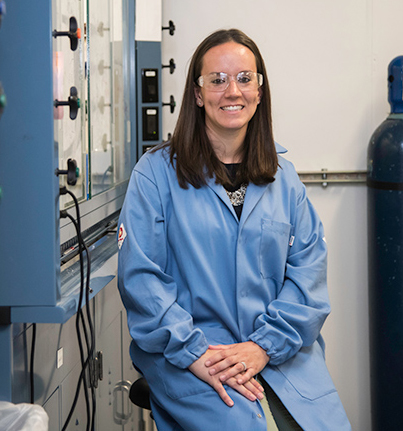News Archive
Chemist Ellen Matson named 2019 Sloan Research Fellow
 Ellen Matson, assistant professor of chemistry at the University of Rochester, is a recipient of the 2019 Sloan Research Fellowship. Awarded annually by the Alfred P. Sloan Foundation since 1955, the fellowships recognize young scientists for their independent research accomplishments, creativity, and potential to become leaders in the scientific community. Each fellowship carries a $70,000 two-year award.
Ellen Matson, assistant professor of chemistry at the University of Rochester, is a recipient of the 2019 Sloan Research Fellowship. Awarded annually by the Alfred P. Sloan Foundation since 1955, the fellowships recognize young scientists for their independent research accomplishments, creativity, and potential to become leaders in the scientific community. Each fellowship carries a $70,000 two-year award.
Matson’s lab studies the reactions that occur between molecules called ligands, and the small, molecular-sized clusters of metal atoms they attach themselves to. Her work is focused on developing catalysts for the conversion of inert gases and contaminants into energy-rich fuels and useful chemical products.
For example, her lab recently reported creating, for the first time, an oxygen-atom vacancy on the surface of a metal oxide. This technique could eliminate much of the guesswork in designing more effective catalysts for converting greenhouse gases to useful chemical fuels. Working with collaborators at the University of Buffalo, her lab has also modified a metal oxide cluster so that it would be nearly twice as effective in storing energy in backup systems for large grids that rely on solar and wind power.
Both of these research areas represent topics “at the forefront of energy science and demonstrate that Ellen is an emerging leader in this field,” says Todd Krauss, professor and chair of the Department of Chemistry. “This creative use of self-assembled, mixed-metal cluster complexes puts her in a unique position to change the landscape of energy-related chemistry.
“Given her remarkable advances in research, it is clear that Ellen is a rising star in inorganic and materials chemistry.”
Matson joined the University in 2015 after serving as a postdoctoral researcher at the University of Illinois-Urbana Champaign. She received her PhD from Purdue in 2013. As an undergraduate she received degrees in both chemistry and science education at Boston University and is licensed to teach high school science.
Since joining the University, she has participated in initiatives to promote improved teaching, including new training for graduate teaching assistants to better prepare them for leading workshops and labs within the department.
She also has collaborated with the Rochester Center for Community Leadership and the Center of Excellence in Teaching and Learning to develop two new undergraduate courses. Both “take innovative approaches to developing unique learning experiences for STEM majors,” Krauss notes.
While laboratory courses provide students with valuable “hands-on” scientific experiences that build upon what they’ve learned in class, Matson explains, “these classes do not support students in the development of essential skills in civic leadership and broad scientific communication. Throughout the ‘real-world,’ much of the practice of science occurs outside of the laboratory, through interdisciplinary collaboration and communication with the public.”
Matson’s previous awards include being chosen as a Cottrell Scholar by the Research Corporation for Science Advancement, which recognizes “the very best early career teacher/scholars in chemistry, physics, and astronomy” for both innovative research and teaching; a National Science Foundation CAREER award; the Edith Flanigen award from Humboldt University of Berlin, which recognizes emerging international talent in metal-oxide research; the Course Hero-Woodrow Wilson Fellowship for Excellence in Teaching; and a University Furth Fund award, given to foster the development of promising scientists in the natural and biological sciences.
Related Links...
- UR NewsCenter, 02/20/19 article by Bob Marcotte:
"Rochester Scientists receive Sloan fellowships" - 2019 Sloan Research Fellows
- Matson Research Group
- Professor Matson Faculty Page
